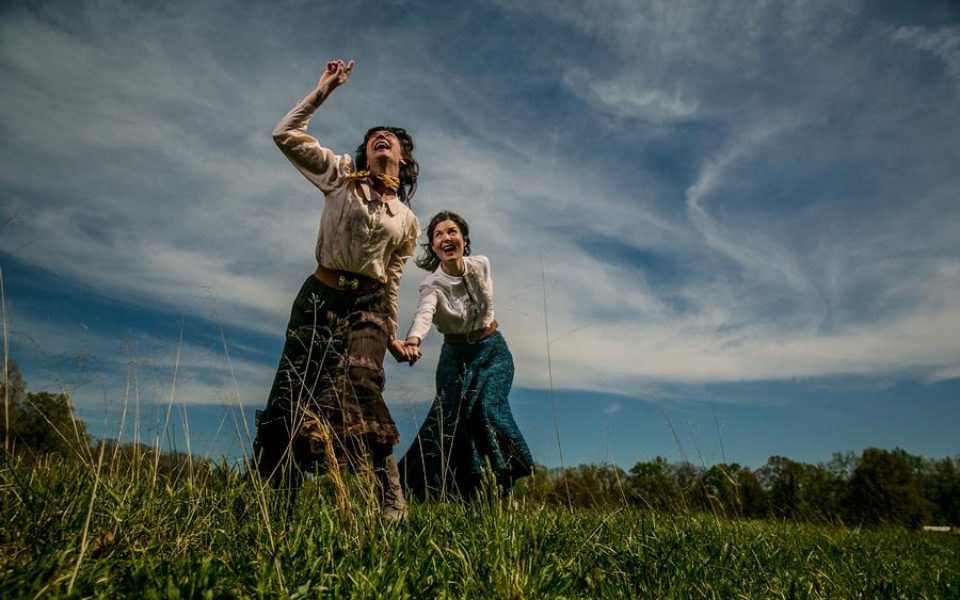by Anthony Harrison
Times change; people change; fortunes wax and wane. But friends are forever.
Or maybe not, in the case of Abundance.
Winston-Salem’s Hanesbrands Theatre, in association with Triad Stage, debuted Beth Henley’s Western comedic drama, Abundance, on Saturday after three nights of preview performances.
“It’s a great way to fulfill our name by playing in two of the Triad’s cities,” Richard Whittington, Triad Stage’s managing director, told the audience before the performance. “We’re still polishing up the show, and you’re a piece of that. If you don’t like tonight’s performance, keep it to yourself; if you do like it, tell everybody.”
The May 7 preview proved that, if anything, the production was ready and raring to go.
Set in the Old West, Abundance tells the tale of two women, Macon Hill (Amy Hamel) and Bess Johnson (Roya Shanks), brought to Wyoming territory as mail-order brides.
Triad Stage had previously produced Henley’s Southern gothic classic Crimes of the Heart at its home in Greensboro’s Pyrle Theatre. Both plays focus on Henley’s perennial themes: female identity and the support women give each other in times of crisis.
The stage was bare for the most part. A table lay on its side at stage left. A semi-circular scrim, with windows and entryways cut at either side of the stage, served as the background, painted with a simple, sepia-toned, impressionistic image of rolling prairie hills and spotty trees. The most major set piece was a scraggly dead tree, wrapped by spiral stairs and surrounded by stacked chairs at the trunk’s base.
“Wyoming Territory, Late 1860s” was written on stage right in yellow chalk.
As the lights went up, Bess Johnson leaned against the table, cooing the old folk song, “Down in the Valley,” a ballad filled with lines like: “Roses love sunshine, violets love dew/ Angels in heaven know I love you.” Shanks was dressed daintily in pink, and her song instantly conveyed a simple, childish innocence.
But in walked Macon Hill, dressed in earthy brown and green, wearing outlandish sun goggles, ranting about how she was “drunk with Western fever,” and that she could “be whatever [she] wants to be” in the West.
The odd-couple dynamic was instantly apparent: Macon Hill is eccentric, bawdy and outspoken, while Bess Johnson is timid, romantic, neurotic and seemingly naïve despite her apparent overeducation.
“I been to school; I oughta know something!” Bess says, despondent. “I can’t even remember my favorite color! Maybe it’s blue?”
Two men soon arrive with bad news. Bess’ husband, Michael Flan, has been killed; the messenger is Michael’s brother, Jack (Zachary Clark), a shabby, brutish man with a six-shooter on his left hip and formidable chips on both shoulders. Jack offers to marry Bess, and she agrees, which is the first in a series of progressively tragic decisions.
Macon’s husband-to-be, William Curtis (Brent Bateman) timidly approaches Macon soon after.
Macon had earlier confided to Bess, “You know what I hope? I hope our husbands ain’t too ugly to stand.”
Will appears, kind and smartly dressed, but scarred: A patch covers his left eye, partly hiding a jagged scar, a souvenir from a mining accident. Macon is clearly upset by his injury, but also agrees to marry him.
The cast drew boxes with chalk on stage left and right, representative of their homes. Chalk would be used to show shifts in the story: changes of seasons and time, shifts in location, the growth and loss of houses.
As Macon and Will grow prosperous in the agriculture trade, Bess and Jack fall on harder and harder times; a mine Jack invests in turns out to be a bust, and Bess miscarries. Winter comes and snow falls outside the scrim’s windows.
Eventually, Bess and Jack move in with Macon and Will, but Bess’s neurotic side begins straining the women’s friendship. At the same time, Macon, once obsessed with striking out further west and running away from her passionless marriage, seems settled in her life of luxury. The women have switched mindsets, but then Bess is driven out of the house by Jack’s harsh needling and is abducted by an American Indian tribe at the end of Act I.
The second act featured incredibly layered performances from all the actors. Identities co-mingle, switch and transform unexpectedly. Shanks especially delivered an astonishing performance as the rehabilitated Bess, profoundly and irrevocably changed by her tribal life, exhibiting strength and cunning unimaginable for the young woman timidly humming folk ditties on the ranch.
In the end, Abundance covers some 25 years and spans from Wyoming to St. Louis, from the Wild West to the gateway of the frontier, following the lives of two women and their struggles in finding themselves in a brave new world.
Both women “hunt the elephant,” in their own ways, culminating in heartfelt redemption and reconciliation, suggesting that the strongest bonds may last forever.
Abundance shows this week at Hanesbrands Theatre in Winston-Salem starting on Wednesday evening. Visit triadstage.org for tickets and showtimes.
Join the First Amendment Society, a membership that goes directly to funding TCB‘s newsroom.
We believe that reporting can save the world.
The TCB First Amendment Society recognizes the vital role of a free, unfettered press with a bundling of local experiences designed to build community, and unique engagements with our newsroom that will help you understand, and shape, local journalism’s critical role in uplifting the people in our cities.
All revenue goes directly into the newsroom as reporters’ salaries and freelance commissions.


Leave a Reply